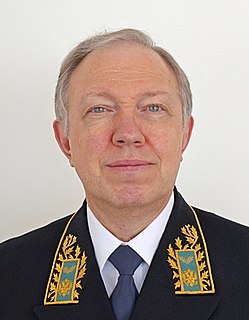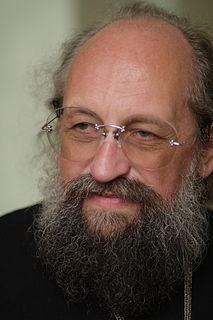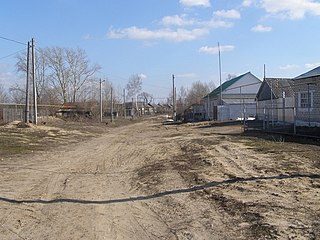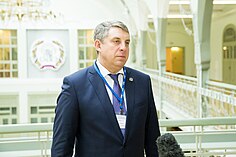
Russia is divided into several types and levels of subdivisions.

Sosnovsky District is the name of several administrative and municipal districts in Russia. The name is generally derived from or is related to the root "sosna" ("pine").

The Tomb of the Unknown Soldier is a war memorial dedicated to the Soviet soldiers killed during World War II. It was designed by architects D. I. Burdin, V. A. Klimov, Yu. R. Rabayev and sculptor Nikolai Tomsky.

Vladimir Igorevich Kozhin is a Russian businessman and politician. Senator from Moscow since 2018. Previously he was an Aide to the President of Russia and head of the Control Directorate of the Presidential Administration of Russia.

Knowledge Day, often simply called 1 September, is the day when the school year traditionally starts in Russia and many other former Soviet republics as well as other countries in the former Eastern Bloc and Israel.

Abkhazia–Russia relations is the bilateral relationship between the Republic of Abkhazia and the Russian Federation. Russia recognised Abkhazia on 26 August 2008, following the August 2008 Russo-Georgian War. Abkhazia and Russia established diplomatic relations on 9 September 2008.

Andrey Alexeyevich Tatarinov is a Russian career diplomat and ambassador who since 20 September 2003 holds the diplomatic rank Minister Extraordinary and Plenipotentiary of the First Class.

Anatoly Aleksandrovich Wasserman is a politician, journalist and political pundit who has won numerous television intellectual quiz shows. Since September 2021 he is a member of the State Duma of the Russian Federation.
The City of Military Glory is an honorary title bestowed upon the citizenry of Russian cities, where soldiers had displayed courage and heroism during the Second World War. The award, which to date has been bestowed upon 45 cities, is similar to the Hero City title awarded during the era of the Soviet Union and no city has yet received both awards.

Ichalkovsky District is an administrative and municipal district (raion), one of the twenty-two in the Republic of Mordovia, Russia. It is located in the northeast of the republic. The area of the district is 1,265 square kilometers (488 sq mi). Its administrative center is the rural locality of Kemlya. As of the 2010 Census, the total population of the district was 20,582, with the population of Kemlya accounting for 23.5 % of that number.
Kadoshkinsky District is an administrative and municipal district (raion), one of the twenty-two in the Republic of Mordovia, Russia. It is located in the center of the republic. The area of the district is 618.6 square kilometers (238.8 sq mi). Its administrative center is the urban locality of Kadoshkino. As of the 2010 Census, the total population of the district was 7,970, with the population of Kadoshkino accounting for 59.0% of that number.

Yelnikovsky District is an administrative and municipal district (raion), one of the twenty-two in the Republic of Mordovia, Russia. It is located in the north of the republic. The area of the district is 1,056 square kilometers (408 sq mi). Its administrative center is the rural locality of Yelniki. As of the 2010 Census, the total population of the district was 11,995, with the population of Yelniki accounting for 49.2% of that number.

Zubovo-Polyansky District is an administrative and municipal district (raion), one of the twenty-two in the Republic of Mordovia, Russia. It is located in the west of the republic. The area of the district is 2,710 square kilometers (1,050 sq mi). Its administrative center is the urban locality of Zubova Polyana. As of the 2010 Census, the total population of the district was 59,256, with the population of Zubova Polyana accounting for 17.5% of that number.

Alexandrovsk is a closed administrative-territorial formation in Murmansk Oblast, Russia. Its administrative center is the town of Polyarny. Population: 42,789 (2010 Census).

Dmitry Medvedev's Second Cabinet was the composition of the Russian government from 18 May 2018 to 15 January 2020 under the leadership of Prime Minister Dmitry Medvedev.

Alexander Bogomaz is a Russian official and politician who is serving as the Governor of Bryansk Oblast in European Russia.

Vasily Alexeyevich Yurchenko is a Russian politician. Governor in Novosibirsk Oblast (2010—2014).

Igor Ivanovich Kobzev, is a Russian statesman and former army officer, who is the incumbent 8th Governor of Irkutsk Oblast since 18 September 2020. He had previously been the acting governor, since 12 December 2019.

Valerii Fedorovych Zaluzhnyi is a Ukrainian four-star general who has served as the Commander-in-Chief of the Armed Forces of Ukraine since 27 July 2021. He is a member of the National Security and Defense Council of Ukraine since 28 July 2021.
Alexander Valeryevich Sladkov is a Russian military correspondent, propagandist, and special correspondent for the Izvestia program. Senior Lieutenant.
















